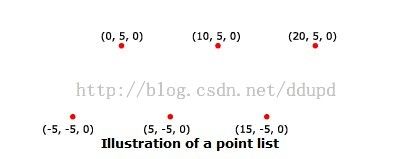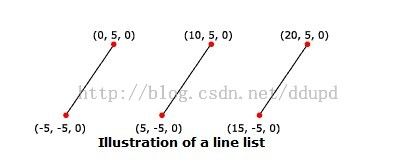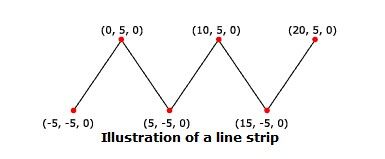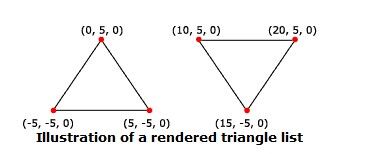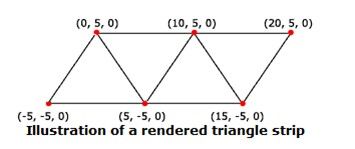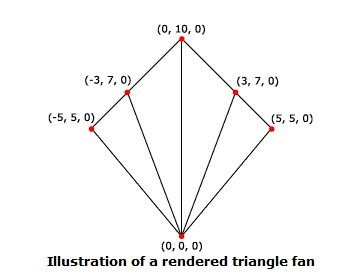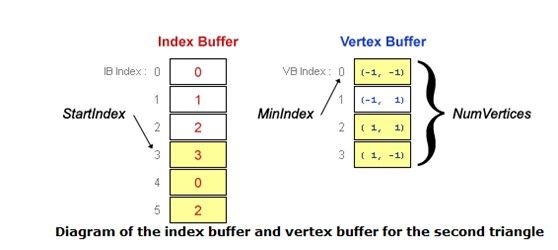关于DrawIndexedPrimitive函数的调用
函数的原型如下所示:
HRESULT DrawIndexedPrimitive( [in] D3DPRIMITIVETYPE Type, [in] INT BaseVertexIndex, [in] UINT MinIndex, [in] UINT NumVertices, [in] UINT StartIndex, [in] UINT PrimitiveCount );
<1> Type:D3DPRIMITIVETYPE枚举成员中的一个,表示绘制的图元类型
typedef enum D3DPRIMITIVETYPE {
D3DPT_POINTLIST = 1,
D3DPT_LINELIST = 2,
D3DPT_LINESTRIP = 3,
D3DPT_TRIANGLELIST = 4,
D3DPT_TRIANGLESTRIP = 5,
D3DPT_TRIANGLEFAN = 6,
D3DPT_FORCE_DWORD = 0x7fffffff
}D3DPRIMITIVETYPE, *LPD3DPRIMITIVETYPE;
其中D3DPT_POINTLIST表示点列
D3DPT_LINELIST表示线段列
D3DPT_LINESTRIP表示线段带
D3DPT_TRIANGLELIST表示三角面列
D3DPT_TRIANGLESTRIP表示三角面带
D3DPT_TRIANGLEFAN表示扇形面
<2> BaseVertexIndex
顶点缓存中距离第一个顶点的偏移量,这里说的都是顶点缓存中的索引。
BaseVertexIndex is a value that's effectively added to every VBIndex stored in the index buffer.
它是要添加到索引缓存中存储的顶点缓存的每一个值上的。
<3> MinIndex
函数调用中最小的索引。这是以0为基础,相对于BaseVertexIndex的索引,当然是针对顶点缓存来说的。
<4> NumVertices
函数调用过程中用到的顶点数,第一个顶点是BaseVertexIndex +MinIndex
<5> StartIndex
当访问顶点缓存的时候用到的第一个索引的的索引,
<6> PrimitiveCount
图元的个数
下面几幅图最能说明BaseVertexIndex,MiniIndex,StartIndex,以及NumVertices的含义
<1> 当BaseVertexIndex =0
此时的函数调用如下所示:
DrawIndexedPrimitive( D3DPT_TRIANGLELIST, // PrimitiveType
0, // BaseVertexIndex
0, // MinIndex
4, // NumVertices
3, // StartIndex
1 ); // PrimitiveCount
<2>当BaseVertexIndex ≠0

此时索引缓存中的没一个值都要加上一个BaseVertexIndex的值来表示真正的索引。函数的调用如下所示:
DrawIndexedPrimitive(D3DPT_TRIANGLELIST, // PrimitiveType
50, // BaseVertexIndex
0, // MinIndex
4, // NumVertices
3, // StartIndex
1 );
